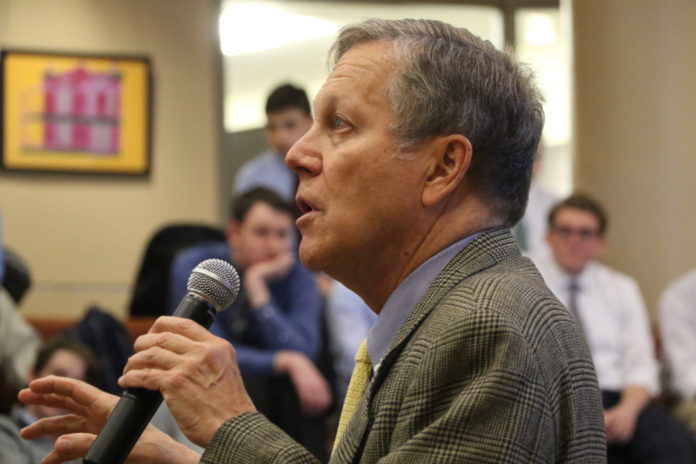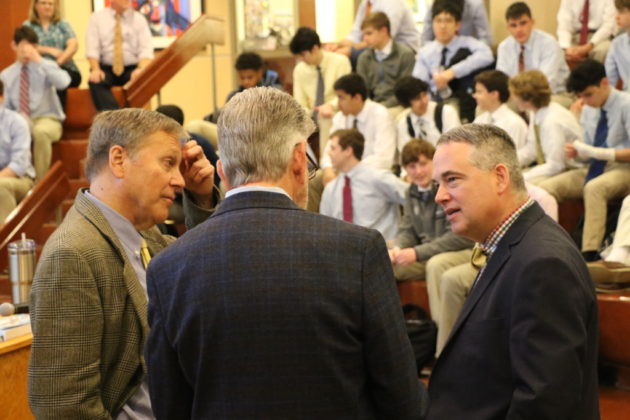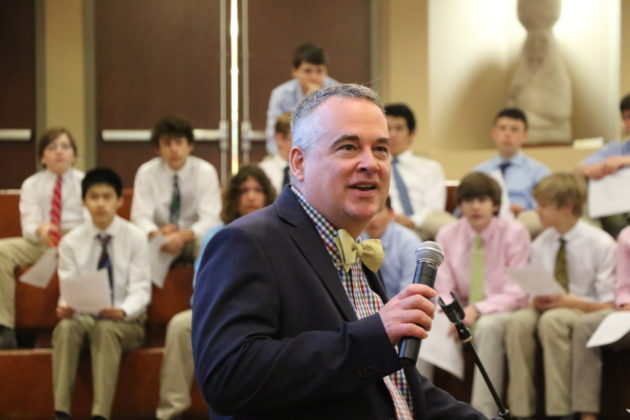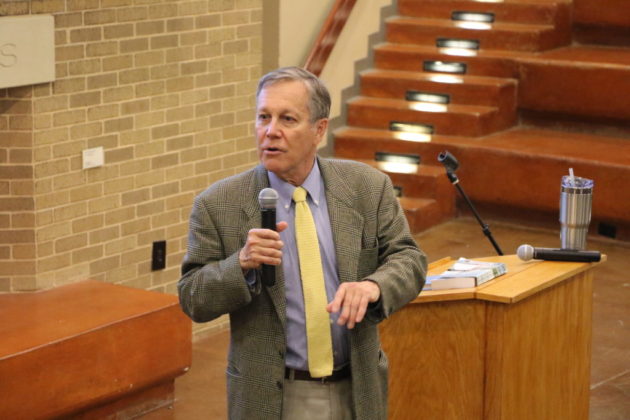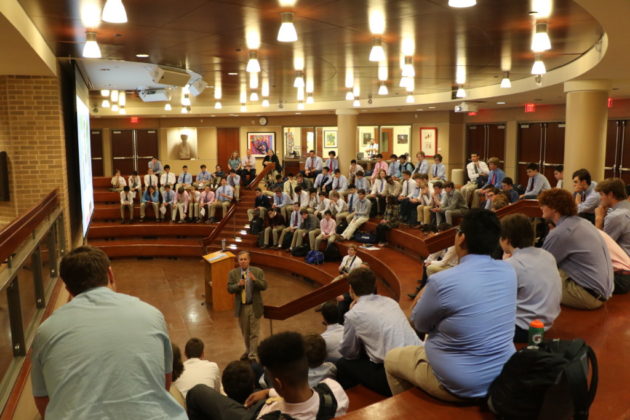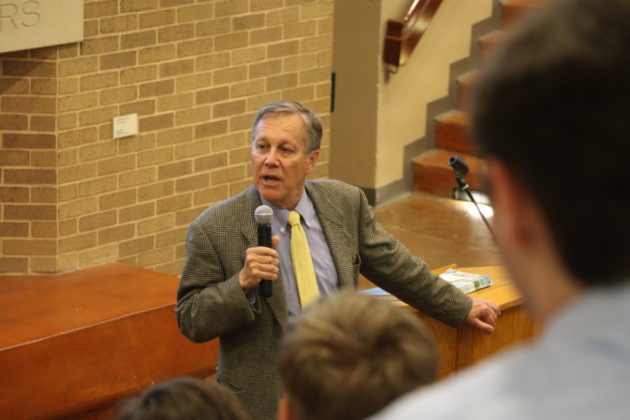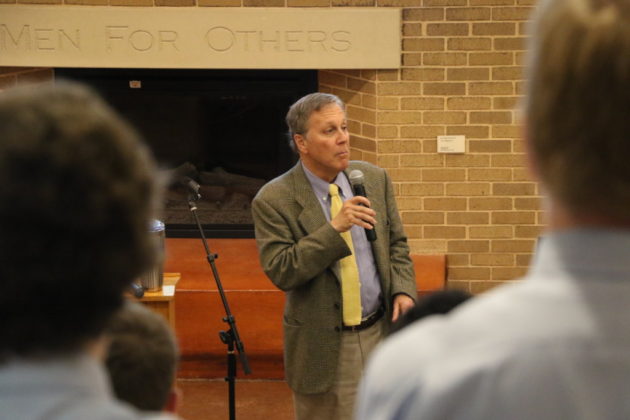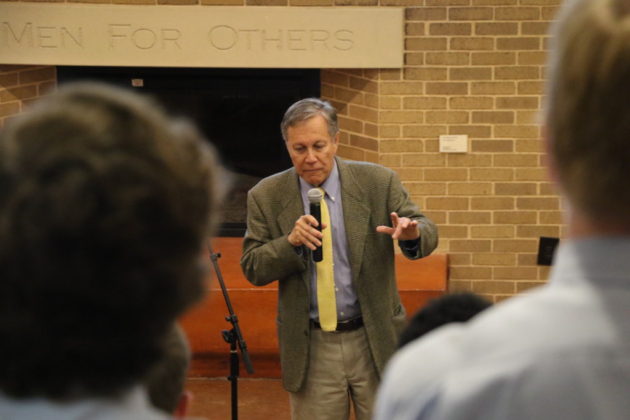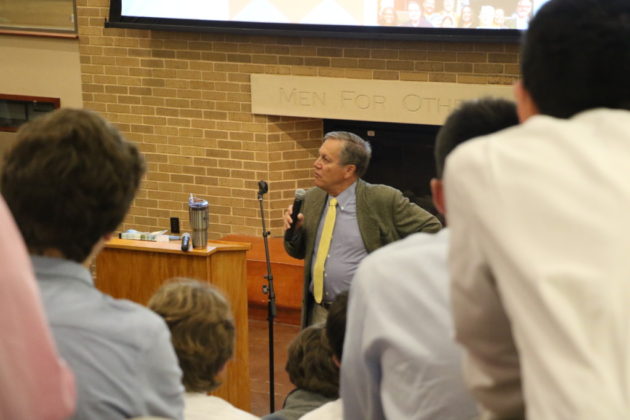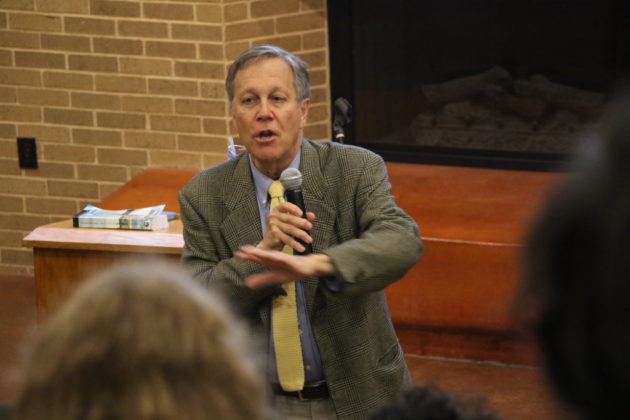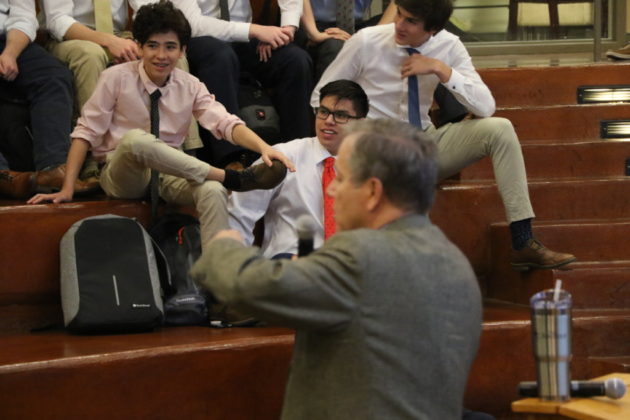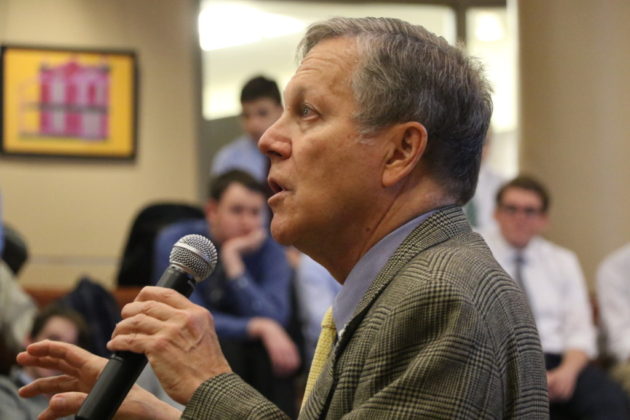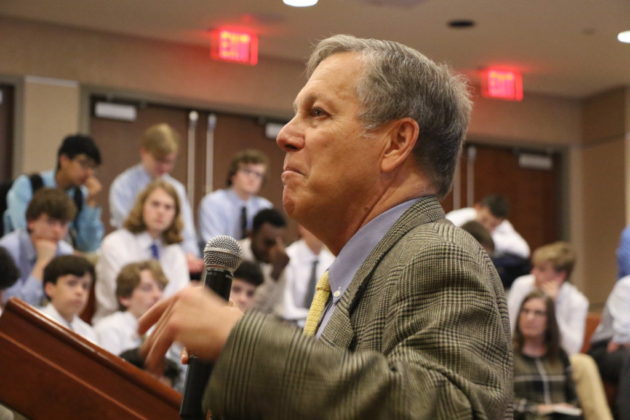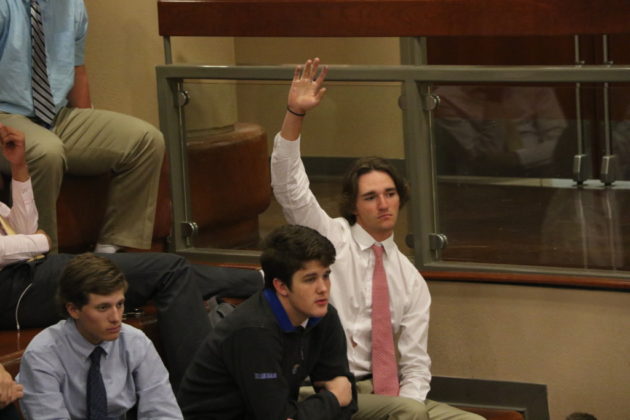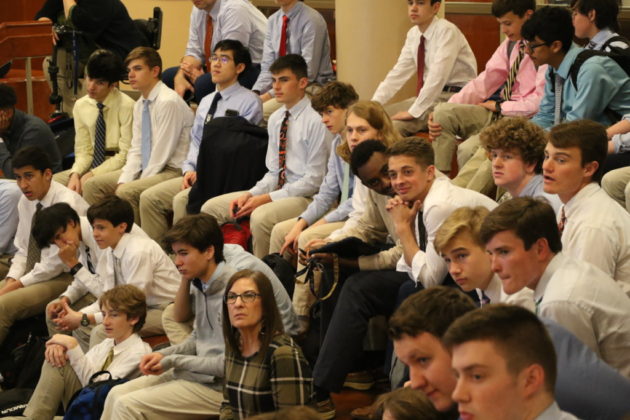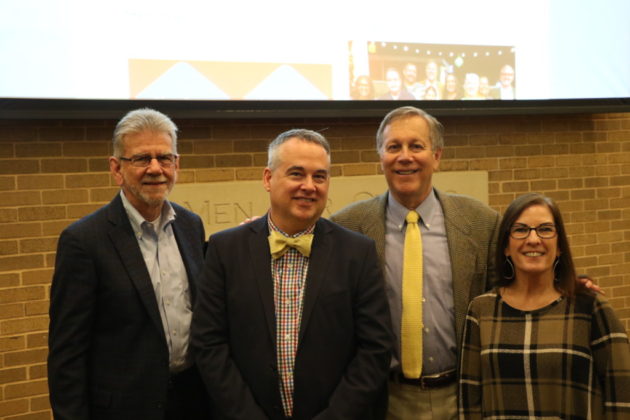Can poetry matter? It depends on who you ask. While the English department would respond with a resounding yes, Jesuit’s student body might take an opposing stance. If you ask renowned American poet Dana Gioia, he will respond with a provocative essay dubbed “undoubtedly one of the most important American books of poetry criticism of the last 50 years.” (Adam Kirsch, The New York Sun)
Mr. Dana Gioia paid a visit to Hughes Hall on Monday, April 8 to share his rise to international poetic fame and answer questions from the Jesuit student body ranging from “how do you appeal to the universality of human emotion?” to “do you like modern rap music?’
Who are you?
I’m a working-class, Catholic kid from the rough part of L.A. I’m from the town of Hawthorne. Those of you who have seen Pulp Fiction or Jackie Brown, Quentin Tarantino likes to film his movies in Hawthorne. He captures the charm of the town.
So, it was a rough place to grow up. From an early age, I knew I kind of wanted to be an artist. I wasn’t quite sure; I was mostly interested in music. I read a little bit of poetry, and my mother used to recite poems to me, but I never thought of myself as being a poet. I liked music, I liked literature in a general sense, and I thought I would probably grow up to be a composer or a performer.
But I had an issue, which is if you’re a poor kid from L.A. and you want to be an artist, you’ve got to figure out a way of making a living first. So I had a job from the age of nine on. When I was in high-school I worked, when I was in college I worked every vacation and everything else, so I’ve always had a good work ethic. I was always interested in things that were not part of the world I grew up in.
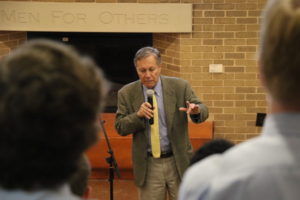
At the age of 19, I knew I wanted to be a poet. I figured, well, what do they do? Become a professor, right? So I went to Harvard for graduate school, I was at Stanford as an undergraduate, and I was being trained there by brilliant people like Elizabeth Bishop, one of my teachers was Robert Fitzgerald whose translation of The Oddessy, The Iliad, and Sophocles you may have studied in school.
But after a couple of years, I realized that they were training me to talk to other professors. I was learning to speak about literature in the language of literary theory that was probably spoken by about seven hundred people in North America, and it didn’t seem to me that I wanted to be able to write in a way that people, where I came from, couldn’t understand.
So I decided to leave. I’d had every crap job you could possibly imagine, and I didn’t want to have another one of working in a warehouse while I’m writing the Great American Poem. So I went to business school, Stanford Business School, and I’m probably the only person in human history who went to Stanford Business School to be a poet.
And nobody probably got through Stanford Business School doing less work than I did. I graduated by the skin of my teeth. I spent three hours everyday writing and reading, then I went up to NY and I entered a business career. I was very successful at that career over time, but fifteen years into my career, I realized, for a variety of reasons, I was working ten hours a day. I was writing on nights and weekends, and I was now a famous poet. People were writing articles about me, and I was publishing in the New Yorker, Atlantic Monthly, New York Times, Washington Post, and so I just quit.
I didn’t have a job, and I just felt that I could probably live by my wits, so for the next thirteen years, I was a writer. I wrote for the BBC, wrote for musicians, wrote poetry, wrote essays, and then I just ended up running the National Endowment for the Arts. I ended up reporting to the President of the United States, running the federal guard station.
Then, after seven years, I worked for President George W. Bush. When Obama was elected I was approached about taking another job and I said, no, it’s time to leave. I wanted to be a writer, so I went back to California. I’m teaching part-time at USC out there, and for the past three years, I’ve been a political writer in California.
So if you look at this, it looks like the resume of someone you wouldn’t hire. He obviously can’t keep the job. So, I’ve been a college professor, a businessman, I’ve run a federal agency, I’ve been a journalist, but these were all strategies to be a poet. I could be able to write the kind of poetry I wanted without having to worry about making a living on it.
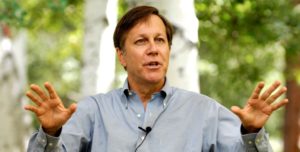
Now poetry probably seems like a very remote art to you. You have to study it in school or you can’t graduate, so it’s something you have a mandatory relationship with, something done under duress. But my own relationship with poetry that was very different. I hardly ever studied poetry in school until I was in college, but it came down to me from my mother. My mother was a woman without much education; she had a very rural, impoverished childhood. My mother’s Mexican and my dad is Sicilian, so grew up with immigrants on both sides. I’m the first person in my family to ever go to college, but she would recite poems. I remember one of her favorite poets was Edgar Allan Poe, and she would just, for no reason at all, recite these poems to me as a kid.
“It was many and many a year ago / In a kingdom by the sea / That a maiden there lived whom you may know / By the name of Annabel Lee / And this maiden she lived with no other thought / Than to love and be loved by me./ Oh I was a child and she was a child / In this kingdom by the sea./ And we loved with a love that was more than love / I and my Annabel Lee / With a love that the winged seraphs of heaven / Coveted her and me.”
Now, I can tell, once I started reciting, not for every one of you, but for most of you, your body language changed somewhat. You begin to hear that language differently. And I experienced this as a kid. My mother, when she would recite these poems, would bring me into a zone of consciousness that was a little different from ordinary daily existence, and it’s part of the enchantment of poetry.
Poetry is a special kind of language that goes back to the prehistoric origins of humanity. If you go back to human history before the West, before there was writing, you were limited in what kind of art you could make, and artists would make art from the human body. This is where the art of poetry was invented. Art, poetry, song, and dance were the same art. You moved your body rhythmically and you chanted words. Not too different from Hip-hop is it? Not too different, essentially, from American Idol.
So what you did is you took body movements, and you created a special kind of language that could pierce through the clutter of everyday speech. You are surrounded, including in this moment, by words. People are always talking at you. It’s not going to change when you’re an adult, when you’re a parent, when you’re working at a place. You are surrounded by a web of words, and you have to protect yourself from this.
I can see most of you have mastered this, by not paying entire attention because you kind of dip in, you dip out, you dip in, that’s normal, that’s human consciousness.
What poetry does, think about this, poetry raises the bar; you pay attention more, you retain more. You allow your memories, your emotions, your intuitions to come closer to the surface. It’s that slight hypnotic spell of meter that causes you to relax.
And my mother would know poems that were kind of odd, poems like Ogden Nash, The Panther:
“The Panther is much like a leopard / Except it hasn’t been peppered. / Should you behold a panther crouch / Prepare to say Ouch / Better yet, if called by a panther, / Don’t anther.”
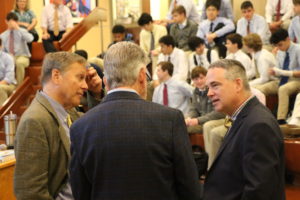 So comic poetry tells a story, and for me, it was just part of the adventures of everyday life. I have an Italian uncle who is very charismatic. Everything in Italian was better than anything else, so when anyone would mention any poet that wasn’t Italian, he would begin reciting Dante.
So comic poetry tells a story, and for me, it was just part of the adventures of everyday life. I have an Italian uncle who is very charismatic. Everything in Italian was better than anything else, so when anyone would mention any poet that wasn’t Italian, he would begin reciting Dante.
So poetry was something that these working-class, uneducated people would want to recite with cooking, wine, playing sports. So, when I went to college, and I was taught that poetry was this remote, intellectual art in which only the smartest people could communicate with each other through complicated, educated code, it didn’t make any sense to me because that wasn’t my human experience of it. And that’s one of the reasons I went to graduate school; I didn’t think that vision of poetry was the right one. Now, not surprisingly, in my lifetime, the audience for poetry has gone down, and down, and down.
But, in the last few years, the audience for poetry has shot way up. And I think it’s largely because a few people in my generation, myself included, began doing it very differently.
We’re bringing poetry back to something that is spoken, heard, musical. I’m a famous poet in American literary history because I was the leader of a group, about 40 years ago, in an age of free verse and experimental verse, that reintroduced rhyme, meter, and storytelling into American poetry.
And it’s a very simple thing, just what do we need poetry for? I know you need it to write papers in high-school, but outside of the academic world, what purpose does poetry have? And the answer is that poetry today, even in the 21st Century, still makes the most concise, expressive, and memorable way we have of using words to describe what it’s like to be alive–what it’s like to be mortal. And as long as we use language in everyday life, poetry will never become out-dated, but you can have a time when most poems are not very good. And, if you have a culture that just idolizes the wrong kind of poetry for the wrong kind of reason, it disconnects from people.
In Chicago, at a tavern, they were inventing the poetry slam, which shows that if the educated class takes poetry away from common people, they reinvent it for themselves. And, when they reinvent it for themselves, it’s got beat, it’s got tune, it’s performative, and in the case of a poetry slam, it’s got a winner and a loser, so they make it into a competitive sport, just like the ancient Greeks did.
And how did Greek poets make a living? They made a living by writing poems and performing them in competition. They all got performed but one walked away with the purse. So it’s just like Dancing with the Stars, it’s just like American Idol, and that’s the kind of energy that we try to bring back to poetry.
In my mind, since I’m mostly a poet, I became a college professor when I was sixty years old, I’m sixty-eight now and I just quit my job, so it’s been a brief interlude. One of the things that I’ve had an opportunity to do is work with musicians. I’ve written the words for four operas, a bunch of songs, I just finished doing a Jazz album with a jazz pianist, which is in Texas, a woman named Helen Sung.
So, when you write for music, you have to make it more simple and direct, here’s one of the songs:
“Let’s go downtown. It’s a hot summer night./ Lovers are sitting in sidewalk cafes/ Breaking up, making up, hooking up, cooking up/ Plans for tonight that leave them amazed./ Let’s go downtown. It’s a hot summer night./ Let’s not stay home and get in a fight./ Let’s eat spicy food in some dark little dive/ And let our bodies know we’re alive./ Summer is here. The young are on fire/ And every tattoo spells a word for desire./ They’re strolling as naked as custom allows/ They never say later. Then only say now./ Let’s live in the flesh and not on a screen./ Let’s dress like people who want to be seen./ Don’t bring me home till the dawn’s early light./ Let’s not waste this hot summer night.”
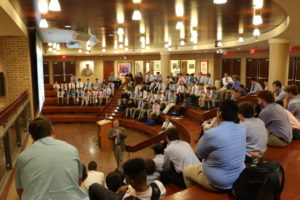 That’s not a poem I would write for The New Yorker, but poetry exists in our culture, curiously, very much like it did in our ancient culture. It’s not so much creative as it is social. A poem without an audience is a diminishment of the art; it could be an audience of one, or two, or three, or it can be an audience of millions, but there’s a kind of reciprocal energy that stems from the participation of the audience.
That’s not a poem I would write for The New Yorker, but poetry exists in our culture, curiously, very much like it did in our ancient culture. It’s not so much creative as it is social. A poem without an audience is a diminishment of the art; it could be an audience of one, or two, or three, or it can be an audience of millions, but there’s a kind of reciprocal energy that stems from the participation of the audience.
One of the main things I’ve learned as a poet, as I got older, is that when I write a poem, I’m not writing a poem for me, I’m writing a poem for us. If it doesn’t work for us, it doesn’t work. Which is to say, I have to leave room for each of you to bring your own life into the poem.
We can go on to another poem that actually came out as a song only this one I think, works much better on the page and became the title poem of one of my books, it’s called Pity the Beautiful.
I recently went out with an extraordinarily beautiful woman, who became extremely wealthy, married a couple of wealthy men, and died. And what happened is that her beauty gave her power. If you’re a really extraordinarily beautiful woman, people do you favors, men flock around you, you know, they want to do favors for you. What happens is, when you lose your beauty, you haven’t learned the things that the ugly people, like the three of us, have learned to get through life, and so when she died, it affected me.
At the same time, I was being asked to write these songs, and so I wrote this poem, which doesn’t mention her personally at all, but the emotions that came in, because I didn’t want it to be about me, I wanted it to be about us. I wanted the people who read it to understand it in the broader sense of the poem, Pity the Beautiful:
“Pity the beautiful / the dolls, and the dishes / the babes with big daddies / granting their wishes. / Pity the pretty boys, / the hunks, the Apollos / the golden lads whom / success always follows. / The hotties, the knock-outs, / the tens out of ten, / the drop-dead gorgeous, / the great leading men. / Pity the faded / the bloated, the blowsy, / the paunchy Adonis / whose luck’s gone lousy. / Pity the gods, / no longer divine. / Pity the night / the stars lose their shine.”
So once you’re done with writing a poem, what’s the next step in the process?
The next process is usually to revise it. I’m going to tell you how I work.
Every week, some editor asks me for work, and I usually say that I don’t really have anything. When I finish a poem, I put it aside for a while and I let it ripen, you know. And then I send it out whenever I feel like it.
You’re at an age when you should start by getting your work published. You really should create a literary magazine here, you know? It should be edited by students, containing work by students, that should help in the sense of having the experience of everything I do, in terms of seeing your work published. Also, if you’re working on the staff, you have to judge poems. You get twenty poems and you have to choose which ten, which helps you develop your critical ability for discerning, for editing, for organizing. And the moment you see one of your own works in press, you’re published, you read it differently.
It’s like it’s different seeing a photograph of yourself than seeing yourself in the mirror. It’s just a different level of objectivity that you have. But when I do that, and I send it to an editor. My problem now is that nobody ever rejects anything I write, so I can’t trust the editors anymore.
Sometimes I’ll send it to a friend of mine who’s a poet, and there’s a twelve hour time difference and it comes back with a comment like, ‘I don’t like this one line’ or ‘this one word,’ but even he says, ‘oh great, publish it.’ So I show it to my two sons, both of whom went to Jesuit schools, and they’ll tell me it’s terrible and I shouldn’t publish it, and that doesn’t help much either, so it helps to have a couple of honest readers that will tell you things, but sometimes you just have to wait on it, which is hard when you’re young and you just want to jump in.
What do you think is the most important thing when it comes to writing?
Dana Gioia: The most important thing in writing is clarity, concision, and meaning. Yesterday there was a young poet that came to the University of Dallas presentation and sent us some poems afterward, and they’re all five times as long as they should be.
So poetry has to be concise, but even in prose, it’s essential to cut out every unnecessary word. Because when you cut all the unnecessary words out, you can see the meaning more clearly. So, I’m a real believer in clarity and concision, that way you get a sense that you can unpack all the meaning there.
You can get to a certain stage that you can write very quickly, but that takes years and years of practice. But what really helps, and when I teach, I do this, if I’m teaching you a class in writing, I would break you into pairs and when you finish something you have to show it to him and get his comments, revise it, and turn in both drafts. What happens is that he and you actually both get better because you start to see the mistakes you make in each other’s writing by proofing it together, and you’ll also have a sense of writing for an audience.
How do you appeal to the universality of human emotion?
What I do with my poem is after I draft it out, I take the poem, and do you know what a divining rod is? It’s a thing they used to use in the west where you look for water, it’s a tool of, kind of folk magic where they look for water. I think of having a divining rod for the poem. I look at the poem and as I’m reading it, I’m looking for where the poetry happens. You know in some poems there’s just a moment when the poem breaks your heart, or when part of a song comes along and it really just hits you? I ask, where in this poem does that exist, and if I don’t find it, then I know the poem’s no good. And if I find it, I try to get everything in the poem flowing into and out of that.
So, like Pity the Beautiful, I have three stanzas that are funny, they’re witty, they’re charming–and then suddenly I turn: “Pity the gods, / no longer divine. / Pity the night / the stars lose their shine.” You’re not prepared for that, didn’t it catch you by surprise a little bit?
And so that’s where you get it, that little turn, and I make sure everything keeps you completely engaged until there, then you’re surprised. Then it evokes the emotion.
The other thing you do is making the emotion you give out non-specific, so it’s not just about me, but possibly about the reader’s life. You have to leave enough room in the poem for the reader to come in and bring his or her life.
How has your corporate experience affected the way you write and your poetry?
That’s a good question. I went to Stanford, I did honors English, then went to Harvard. It was a very rarefied intellectual path, so I might be around really bright, learned people, but what happens is that, in order to become a doctor or a professor, you have to develop this private professional language. You hear doctor’s talking about stuff and they’re using all of this terminology, and you have to go to medical school and law school and learn the terminology.
And what happened when I went to business is that suddenly I was with very smart, alert people who were totally non-literary. They never used any of the language that professors did, and that’s the language that I spoke in the office. I’d listen to what they said and how they said things, and the jokes that they would make, and things like this, and it brought me back to earth. It was much better than going to a graduate school.
I had the smart guy stuff like you guys. Why have you ended up in this school? What are the hopes your parents have? Your parents are trying to push you into professional success and academic excellence. You get into a good school, you get into a good profession, you know?
And so, I had that part of it down. What I didn’t have was the common touch, because the people I was raised around didn’t speak English as a native language, you know?
My father would go into a Mexican neighborhood speaking Italian with a Sicilian dialect. So I learned English, then I learned academic English, and what I learned I had to unlearn, so for me, it was very divisive. But the other thing I said to the earlier group, the things that I learned as an artist helped me in business.
When I came in at the entry level job, being a poet made me worse. Because nobody knew I was a poet, but I had all of this kind of sensitivity and creativity. But with every promotion, those skills became more valuable. By the time I got towards the top of the company, I was the only person who had the kind of creative, imaginative thinking, and I was able to solve problems that no one else could solve. I made this company so much money because they couldn’t really re-imagine it, so it was very profound. That’s another reason why I had to quit. When you become successful enough, it kind of carries you along with it, so when the train starts picking up speed it’s probably the safest time to jump off.
What are your thoughts on modern rap music?
I was the first lone critic to write about rap as a literary form, and I think that hip-hop as an artistic technique is an extraordinary thing. It’s funny that it’s the same rhyme that’s used in Beowulf, and the same rhyme that you use in ballads, and that they use in things like, ‘twinkle twinkle little star / how I wonder where you are.’ It’s a four-beat line, and what they do, because they have a sample track underneath them that always lets you know where the beat falls, is that they are then able to play with that four-beat line.
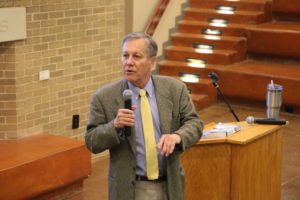 And that’s exactly what jazz did. Jazz took the European bass line, and from the moment that you hear it, you know it’s something different. In fact, when the first European composers came over and listened to jazz music, they couldn’t explain what they were hearing. Neither could they transcribe a Beethoven concerto, so I think that’s fascinating that they created a whole literary form that goes back to the earliest roots of English and uses the oral medium and combines it with electronic performance.
And that’s exactly what jazz did. Jazz took the European bass line, and from the moment that you hear it, you know it’s something different. In fact, when the first European composers came over and listened to jazz music, they couldn’t explain what they were hearing. Neither could they transcribe a Beethoven concerto, so I think that’s fascinating that they created a whole literary form that goes back to the earliest roots of English and uses the oral medium and combines it with electronic performance.
I don’t think, and this is maybe a generalization, that we have a great artist in terms of somebody who is going to write something that a hundred years from now people want to sing to. I think that’s because it’s so caught up in the sociology. In a few years, hip-hop became the most popular kind of recorded music in the world. It was the quickest way to make money, more so than rock or anything else, it’s that it’s sold largely to people like you: white suburban males that are the economic base.
But I think there are lines and passages that are amazing, and I’m kind of interested too, to see if it brings itself out of the context of sociology. But I do think it may be the most important thing that’s happened to American poetry in the last thirty years.
Writing communicates in a lot of different ways. Talking about poetry, you can communicate without having people understand what you’re doing. This is a nonsense verse, it’s about Scottish protestant peculiarities:
“Do not take a bath in Jordan, Gordon, / On the holy Sabbath, on the peaceful day! / Said the huntsman, playing on his old bagpipe, /Boring to death the pheasant and the snipe / Boring the ptarmigan and grouse for fun / Boring them worse than a nine-bore gun. / Till the flaxen leaves where the prunes are ripe, / Heard the tartan wind a-droning in the pipe, / And they heard Macpherson say/ Where do the waves go? / What hotels/ Hide their bustles and their gay umbrellas? / And would there be room? / Would there be room?/ Would there be room / For me? / There is a hotel at Ostend / Cold as the wind, and without end, / Haunted by ghostly poor relations / Of Bostonian conversations / Like bagpipes rotting through the walls. / And there the pearl-ropes fall like shawls/ With a sound like marine waterfalls./ And another little drink wouldn’t do us any harm! / Pierces through the Sabbatical calm. / And that is the place for me! / So do not take a bath in Jordan, Gordon, / On the holy Sabbath, on the peaceful day / Or you’ll never go to heaven Gordon Macpherson, / And speaking purely as a private person / That is the place, that is the place, that is the place for me!”
I don’t know what the hell that poem means, but what I do know is that when I hear it, all kinds of images, emotions, and associations begin to rush through my mind. It’s almost like if you’re in a foreign country and you see all these things happening, you’re not quite sure what they mean, what the people are doing, but it still has meaning to you. You’re trying to sort that through. There is a kind of writing that exists like that.
Now that’s probably not the kind of writing you’re encouraged to do in high-school. So what you’re doing is more like the question that was asked over here which is how do you make writing and make it clear, make it concise, make it persuasive.
Do you speak Spanish?
I can read it. My mother married into my father’s family, which all lived in a bunch of apartments, and she was the only non-Italian speaker. So I spoke English at home, Sicilian around me, English in school, we did Latin at mass at church, and the neighborhood was a Spanish speaking neighborhood, so I have very bad Spanish, but I read it very well. I can understand it pretty well too, but I never developed the facility for speaking it.
In high school, I had Latin, then in college, I learned German and French. The Italian my family spoke at home was very different from regular Italian or Spanish. Then I learned to read it.
Do you ever get writer’s block?
Every day. I find it very difficult to write. My typical day is that I get up as late as possible, I drink lots of coffee, I read the paper, and I delay starting the work as much as I can. Then I go to work and answer all of these emails.
This composer will be asking this, that, and the other, then I finally start to get ready to write, but by now it’s lunchtime, so I just go and have a huge lunch. My wife is usually off volunteering at Catholic charities or something, then I say, why don’t I just do some work, and then I sit down at my desk and nothing happens–and I say, why do I think I’m a writer? Who am I kidding? Why put myself through so much misery? Why put my family through this failure, you know? God, if I had any courage I’d kill myself. By now, it’s about 3:00 and at that point, my self-contempt heats and the inspiration comes. Then I just start writing for hours. Whatever it is, I’ve got to go through this whole ritual, you know?
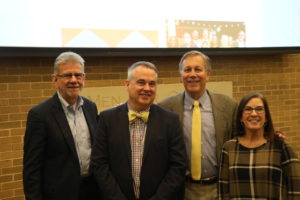
Biography credit: https://www.poets.org/poetsorg/poet/dana-gioia


